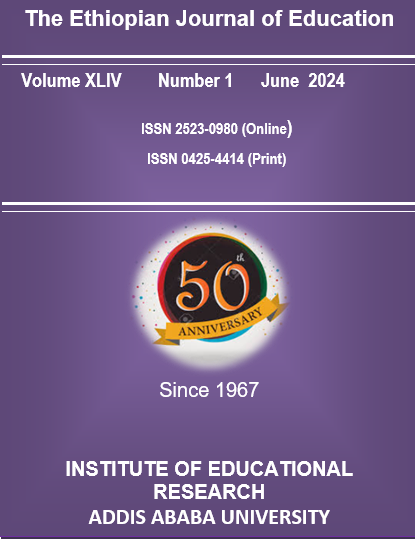Student Peer-Assessment of Learning in Some Selected Universities of Ethiopia: Practices and Challenges
DOI:
https://doi.org/10.63990/eje.v44i1.10031Keywords:
Scaffolding, peer-review, peer feedback, student-centred assessment, cooperative learning strategies, and student peer-assessmentAbstract
The major purpose of this study is to examine the extent to which student peer-assessment (SPA) of learning is practiced and the factors that affect its implementation. A mixed methods research design was employed in the study. Instructors, College Deans, department heads and undergraduate students were the major sources of data for this study. A total sample of 293 participants (258 questionnaire respondents, and 35 key interview informants) was involved in the study. Purposive and proportionate stratified random sampling techniques were employed for selecting the samples. Questionnaires and interviews were used to collect data. Both descriptive statistics (mean, percentage and standard deviation) and inferential statistics (one-sample t-test, independent samples t-test and one-way ANOVA) were used to analyze the quantitative data, while the thematic analysis technique was employed to analyze the qualitative data. The result of the study revealed that SPA is not aligned with the social constructivist principles and theories of learning, in the context of the three sample universities. The study also showed that the level of practising SPA of learning is very low in the context of the sample universities. The study also found that lack of adequate awareness, knowledge and skills among the students on how to apply peer-assessment techniques; lack of standard working document (peer assessment policy, guideline or directive); strong resistance from the instructors to maintain their power and control over assessment; threat from the side of instructors that SPA diminishes teachers’ power in decision making and that sharing assessment with students lowers the standards; and lack of clear criteria for the peer-assessment tasks were reported by the study participants as the major bottle necks to the effective implementation of SPA. The study findings generally show that the assessment scheme in the context of higher learning institutions in Ethiopia has not yet transformed from the traditional teacher-centred notion to the modern student-centred conception; it is still driven and dominated by the teacher and did not create a window of opportunity for students to engage in the design and judgment of their own performance and assessment tasks.
Downloads
Downloads
Published
How to Cite
Issue
Section
License
Copyright (c) 2024 Dame Abera

This work is licensed under a Creative Commons Attribution 4.0 International License.


